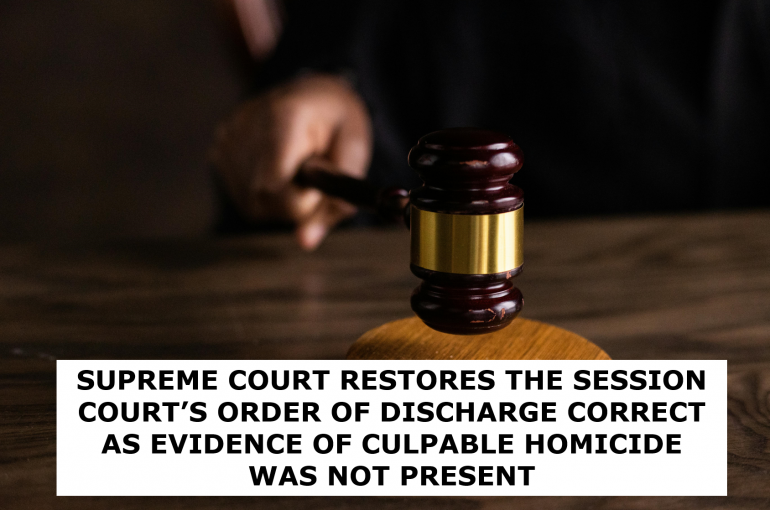SUPREME COURT RESTORES THE SESSION COURT’S ORDER OF DISCHARGE CORRECT AS EVIDENCE OF CULPABLE HOMICIDE WAS NOT PRESENT
A two Judge Bench of the Supreme Court comprising of Justice Abhay S. Oka and Ujjal Bhuyan passed a judgement dated 18.01.2024 in Ramalingam & Ors. v. N. Viswanathan Criminal Appeal No. 212 Of 2024 where the Supreme Court allowed the Appeal and set aside the Order of the learned Single Judge of the High Court of Judicature at Madras.
Facts
The present Appeal was filed in the Supreme Court, challenging the Order of High Court of Judicature at Madras. The High Court by the Order dated 20.12.2018 set aside the Order of the Additional District and Sessions Judge, which discharged the Appellants under Section 227 (Discharge) of Code of Criminal Procedure 1973 (CrPC), from the charges framed against them for culpable homicide. The learned Additional District and Sessions Judge acquitted the Appellants from the charges. Later, Respondent’s father who was the husband of the deceased Siddammal, challenged the Order by filing a Revision Application. The High Court, through the impugned Judgment and Order, allowed the Revision Application and remanded the Additional District and Sessions Judge for holding the Trial.
The Respondent’s father (PW-1) had lodged a FIR alleging the commission of offences under Sections 341 (Punishment for wrongful restraint), 323 (Punishment for voluntarily causing hurt) and 302 (Punishment for Murder) of the Indian Penal Code (IPC) against the Appellants. It was alleged that first Appellant encouraged the Second Appellant to kill the Respondent’s mother (deceased). Thereupon, the second Appellant picked up a stick lying at the site and assaulted her on the chest. After that, the third and first Appellant kicked the deceased on her chest and stomach. The Respondent’s mother was declared dead in the hospital where she was taken. After completion of the investigation, the investigating officer submitted a Final Report stating that the death of the deceased was due to natural causes and that the Respondent’s father had falsely implicated the Appellants of the said charges due to prior enmity. The Trial Court recorded evidence of witnesses, including a doctor who performed a post mortem examination. The doctor testified that the death was natural and that the case made out by the Respondent’s father was false. The doctor reiterated that during the post mortem examination, no external injuries were noticed on the body of the deceased. The High Court, despite referring to the post mortem certificate, ignored the doctor’s evidence and convicted the Appellants.
Issues
1) Whether Session Court was correct in discharging the accused persons under section 227 of CrPC?
2) Whether the Judgement of High Court was erroneous in the sense that it ignored the statement made by the doctor and the findings of the post-mortem report appropriately?
Decision by High Court
The High Court, found the Order of Session Court erroneous and by setting it aside, ordered to move further with the trial. It was contended by the Appellants, that the High Court did not considered the doctor’s opinion that cause of death was natural and that no bruises or external injuries were found on the body of the deceased.
Decision by Supreme Court
The Apex Court held that the statement made by the doctor was backed by the physical absence of wounds on the deceased’s body. Furthermore, according to the statement made by PW1 the Appellants hit the deceased on chest but there was no evidence showing the same since there were no marks present on the deceased’s body. Furthermore, there was a history of personal vendetta between the Respondent and the Appellants which the High Court failed to take into consideration while delivering the impugned Order. The Supreme Court, taking into consideration all the submissions made, held that Order of Sessions Court was correct and free from error. There was a mistake on part of High Court in examining the case and thereby, Supreme Court set aside the Order passed by the High Court and discharged the Appellants from charges framed against them.
Editor’s Comments
It is of utmost importance that the Courts while passing orders and setting aside orders of subordinate Courts, ensure that there is a thorough examination of evidence and that the pleadings and submissions being made are examined and must be in consonance with the evidences present on record. Setting aside should not become a norm as the same instils doubt over justice disposal system. Hence, as in present case, it is important that Courts ensure a holistic examination of the issue and submission along with the supporting evidence, and only thereafter upon being satisfied should decide to take a different view of the subordinate court’s decision.
Arjav Jain
Associate
The Indian Lawyer & Allied Services
Edited by-
Sushila Ram Varma
Chief Consultant
The Indian Lawyer & Allied Services





































Leave a Reply